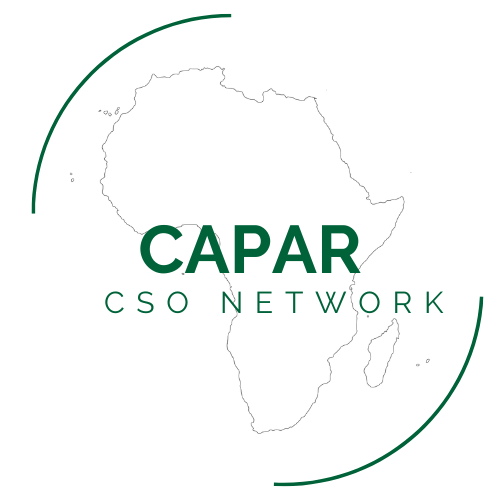Arusha, 10 July 2023

The CAPAR Civil Society Network, formed of civil society organisations across Africa and facilitated by CiFAR – Civil Forum for Asset Recovery, congratulates the African Union on the successful organisation of the “Continental Symposium on AUCPCC, 20 Years After: Achievements and Prospects”.
The CAPAR Civil Society (CSO) Network was formed at the Global South Forum, an international gathering organised in Nairobi on 9-11 November with the aim to build cross-border civil society collaboration around the ongoing efforts on advancing stolen asset recovery in the Global South.
The CAPAR CSO Network aims to build on the opportunities presented by the Common African Position on Asset Recovery (CAPAR), adopted in the framework of the African Union in February 2020. In particular, it aims to:
- Monitor the implementation and progress of commitments made by AU Member States on fostering asset recovery when they agreed on the CAPAR.
- Advocate for much-needed reforms of asset recovery legislation, institutions and practice in Africa.
This year’s African Anti-Corruption Day, celebrating the 20th anniversary of the adoption of the African Union Convention on Preventing and Combating Corruption, is an important occasion to reflect on progress and shortcomings in recovering stolen assets on the continent since the adoption of the Convention.
In the past 20 years, African governments have made considerable progress to recover stolen assets as a tool to combat Illicit Financial Flows and contribute to sustainable development. Asset recovery has gained attention among governments, the media and citizens. Several governments have introduced new asset recovery laws and created institutions in charge of recovering or managing stolen assets. This has led to an increase in recovered assets, both domestically and internationally. However, legislative and institutional frameworks, as well as efforts in international cooperation are still insufficient.
Asset recovery and the fight against kleptocracy are a question of justice and a fundamental step towards sustainable development at the global level and African levels. Therefore, all efforts should be made to prevent the theft away from, and facilitate the return of illicit wealth to, the people to whom it belongs.
Despite the growing importance given within international standards and best practices, Member States are however still not adequately adhering to the principles of transparency, accountability and participation in asset recovery.
Civil society should be included more systematically and comprehensively in asset recovery processes, including through information sharing, monitoring of recovered assets and decision-making on how recovered assets should be used to compensate victims of corruption.
The Common African Position on Asset Recovery (CAPAR) represents a unique opportunity in the framework of the African Union for the development of more efficient, transparent and inclusive asset recovery processes.
We therefore resolve to encourage the full implementation by AU Member States of the commitment made in the CAPAR. In particular, we ask Member States:
Under Pillar 1 of CAPAR, “Detection and Identification of Assets”, to urgently introduce measures for tracing and identification of stolen assets, including:
- Comprehensive whistleblower protection through legislation and practice
- Strengthen the role of and ensure resources and autonomy for detection bodies, such as Financial Intelligence Units (FIUs)
- Enhance transparency around public pay.
Under Pillar 2 “Recovery and Return of Assets”, to develop comprehensive, measurable and efficient asset recovery strategies and legislation for the return of assets, including:
- Legal reform to ensure alternative measures to asset recovery, including Unexplained Wealth Orders, Non-Conviction-based Forfeiture, and other legal tools
- Proactive engagement with the global financial architecture and the reduction of barriers to recovery with non-AU Member States;
- Strengthen domestic institutions responsible for recovering assets, clarifying roles and responsibilities and providing them with adequate resources and autonomy
Under Pillar 3 “Management of Recovered Assets”:
- Urgently adopt transparent, inclusive and efficient returned asset management frameworks, including through independent monitoring mechanisms with civil society
- Establish dedicated agencies responsible for managing recovered assets
- Where they exist, provide agencies responsible for managing assets with adequate resources, technical capacity and autonomy
- Develop provisions for victim compensation and the inclusion of victims in asset recovery processes, making all possible efforts to ensure that returned funds are to returned to victim groups, where identifiable.
Under Pillar 4 “Cooperation and Partnerships” to adopt measures to strengthen global, regional and national cooperation on asset recovery. This includes:
- Providing mechanisms and channels of communication for the inclusion of civil society in all phases of asset recovery
- Joining cross-border and cross-regional anti-corruption and asset recovery initiatives
- Developing resources to cross-border cooperation and partnerships,
- Strengthening domestic cooperation across agencies and governments.
In addition to implementation of article 16 of the AUCPCC, we further call on AU Member States to adhere to international standards and best practices for transparent and accountable asset recovery processes, including the United Nations Convention Against Corruption (UNCAC), the Global Forum on Asset Recovery (GFAR) Principles and the Civil Society Principles for Accountable Asset Return.
We also call on the international community to increase support of African governments in recovering stolen assets stashed in financial institutions in the Global North and offshore centers to invest them in implementing the SDGs.
For inquiries, please contact: info@cifar.eu
